Here’s how you can get ready for Open Farm Sunday
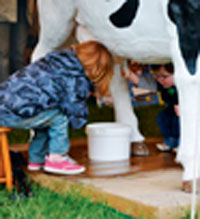
Maybe it’s that farmers make better showmen than professional event organisers. But in less than five years, one annual event has grown to dwarf many others that are well established in the farming calendar. Since 2006 Open Farm Sunday (OFS) has seen almost 1000 farms open their gates and welcome 500,000 visitors.
No commercial goldmine or political compulsion has fuelled this success, says LEAF (Linking Environment And Farming), the organisation that organises the event. Simply a public that yearns to know the truth behind its food, and farmers proud to share it.
Open Farm Sunday 2010 gets under way next month, as LEAF hosts 21 workshops on farms up and down the country. These prepare farmers for the big day on Sunday 13 June. They are a chance for first-timers to get some valuable tips on how to make the event a success, and for the more experienced to share ideas and banish myths.
“The biggest challenge we face are farmers who feel they haven’t got enough to show – that people will come on to their farm and go away disappointed,” says OFS manager and Oxfordshire farmer Tom Allen-Stevens. “But that simply isn’t the case. According to visitor feedback a staggering 98% of those surveyed in 2009 rated their day as good, amazing or brilliant.”
This level of public support has not gone unnoticed by major retailers and food manufacturers, who are now coming on board in growing numbers as sponsors. “We’ve always had strong cross-industry support from a number of partners such as Frontier Agriculture, National Grid, Waitrose and Warburtons,” says Mr Allen-Stevens. “But for 2010 they are joined by Asda, Morrisons and Marks & Spencer. It’s such an obvious fit, especially for retailers, as OFS gives people a true insight into how their food is grown and how the countryside around them is cared for.
“What’s perhaps more remarkable are the two major retailers that haven’t yet cottoned on.”
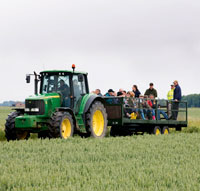 The event also receives funding from DEFRA and Natural England in particular, while waste resources action programme WRAP has now joined as a principal sponsor. “The sponsorship is crucial. It pays for resource materials and every farm that hosts an event gets a free support pack. It also pays for the workshops, a well-equipped website and national publicity to drive people to events. Sponsors also get involved and put a lot of time and staff resources into helping individual farmers put on well-run, accomplished events.”
The event also receives funding from DEFRA and Natural England in particular, while waste resources action programme WRAP has now joined as a principal sponsor. “The sponsorship is crucial. It pays for resource materials and every farm that hosts an event gets a free support pack. It also pays for the workshops, a well-equipped website and national publicity to drive people to events. Sponsors also get involved and put a lot of time and staff resources into helping individual farmers put on well-run, accomplished events.”
But it is the farmers themselves that make these a success, says Mr Allen-Stevens. “Every event is unique and they span the whole spectrum of farming activity. It ranges from a quiet farm walk and a cup of tea for 20 or so in the village, to the vegetable Olympics entertaining thousands. Some organise special displays, such as sheep-shearing or even pig-racing, but visitors are equally fascinated to see a real milking parlour in action.”
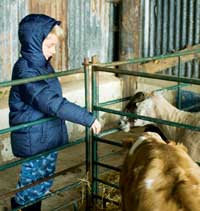 Animals and machinery are the top attractions. These present issues over health and safety, particularly in relation to the recent E Coli O157 outbreaks on open farms. “You need to be mindful of health and safety, but it shouldn’t overshadow your day,” says Mr Allen-Stevens. “If you let visitors mingle with animals you must provide hand-washing facilities with clear signs, and you must segregate eating areas.”
Animals and machinery are the top attractions. These present issues over health and safety, particularly in relation to the recent E Coli O157 outbreaks on open farms. “You need to be mindful of health and safety, but it shouldn’t overshadow your day,” says Mr Allen-Stevens. “If you let visitors mingle with animals you must provide hand-washing facilities with clear signs, and you must segregate eating areas.”
Guidelines have been drawn up with the Health and Safety Executive. The workshops and other material provided by LEAF take farmers through the essentials and the simple practical measures they can take to ensure their farms are safe. “You need to do a simple risk assessment and inform your insurer.”
Telling the food and farming story is another focus of the workshops and the support LEAF provides. “Visitors come to meet the farmer, and we really do have a fascinating story to tell. The aim at the workshops is to provide a few pointers on how to do that in a truly engaging way. For example, start with a loaf of bread and take your visitors on a journey back to where it came from.”
Another crucial element is publicity. “As farmers we’re generally pretty clueless when it comes to promoting ourselves. The resource pack gives you the tools you need – from postcards to distribute at local schools to roadside banners. There are also tips on how to get the local media on your side.”
The support is geared towards helping those farmers keen to get their business and their industry off the lowest cost denominator treadmill, says Mr Allen-Stevens. “Farming isn’t an industry blessed with an innate ability to market itself to the public. So if you’re looking to diversify and get some local custom, you face a chasm of a skills gap. OFS gives you the stepping stones to bridge that.”
As a national event, there are hundreds of farmers taking the same journey, he points out, which gives it a very special collective buzz. “You flick on breakfast TV or the radio on Sunday 13 June and everyone will be talking about it. That’s when you’ll realise you’re part of a national event that really is making a difference to how farming is perceived.”
Why should I open my farm?
For your business
If you’re planning a diversification venture, whether that’s direct sales to the consumer or a visitor attraction, this is an ideal way to test the market. It can also help smooth the path of a planning application, or if neighbours don’t understand why harvesting is dusty and or why your slurry lagoon smells.
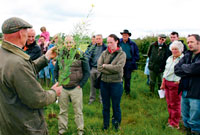 For your community
For your community
Farms have a rightful place as a focal point in the rural community, and OFS helps you establish this. Many farms join forces with the local pub or village groups and turn it into a real community event. It’s also proven to be a key motivator for farm staff, and builds relationships with neighbouring farmers, who are among the 5,500 helpers at events.
For your industry
No other event has so much cross-industry support, so few critics, and does as much to help everyone understand the true story and value behind their food and the dedication and skill of the farmers who produce it. With the Campaign for the Farmed Environment now under way, promoting what we do and how we care for the countryside has never been more important.
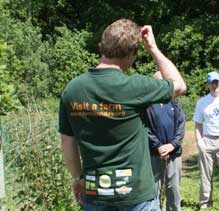 How do I go about it?
How do I go about it?
Step one – register your farm. Go to www.farmsunday.org and sign up, adding details of activities you may be planning, opening times and special instructions, and even pictures. The site has a find-a-farm feature that gets up to 100,000 hits a day in the run-up to OFS itself.
Step two – order your resources. Choose publicity material, activity sheets, information booklets, banners, polo shirts and plenty more, all provided free of charge. The packs have been put together to help ensure your event is a success.
Step three – go to a workshop. These are also free to attend and have been carefully structured. You get tips on how to tell the story of your farm and tackle tricky questions. There’s also clear guidance on keeping your event safe and keeping the number of visitors at the right level. Many farmers go to the workshop first to find out more and then register afterwards. To book a place, call 024 7641 3911 or email pauline.wood@leafuk.org.
Academy answers
There’s more information and advice from HSE for open farms on avoiding problems with E Coli O157 in a special Academy on FWi.
Case Study First-timer
A desire to get over to the general public a true picture of what farmers actually do drove Simon Pain to host his first Open Farm Sunday in 2009 at Billow Farm, near Berkeley, Gloucestershire. “We wanted to show that farming is about conservation, as well as the fruits of the land,” he says.
The grassland and arable farm is in its second year of organic conversion. The 70 or so visitors last year saw hay being rowed up and baled, got to explore machinery supplied by the local John Deere dealer, and tasted a variety of locally sourced meats, including venison from a nearby deer park. “Gather as much information as you can about Open Farm Sunday to be sure your event goes well. It’s a great way for people to enjoy the countryside, and a great way to get to know people in your local community that, as farmers, you rarely get to meet.”
Case Study experienced host
A proper working farm is what around 400 visitors experience at Shawcroft Farm near Ashbourne on the edge of the Peak District. “We shear all the sheep, scan some of the cows and show visitors through the parlour at milking time,” says Angus Dalton, who has hosted an event every year since 2007. “We encourage people to get close – feel the fleeces, see the unborn calf’s heart beating on the ultra scan monitor – and they’re absolutely amazed.”
He’s already started planning for 2010 and is hosting one of the workshops on 25 March. “Preparation is the key. Make sure you have plenty of help and get the word out to schools and local groups. But it’s very rewarding – you’re reaching out to your local community and showing people where their food comes from. You feel you’re really doing some good.”
